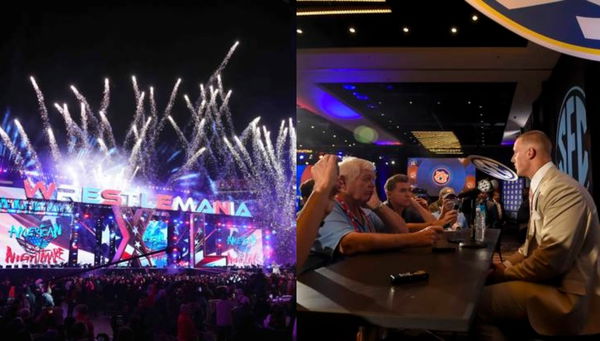

“College football is starting to look a lot like WWE,” Chase Thomas quipped on a recent episode of The Chase Thomas Podcast. Alongside Matt Green, they discussed the growing parallels between the relentless schedules of college football and professional wrestling. As the sport expands to include more games and events throughout the week, fans and analysts are increasingly concerned about potential burnout and the impact on the viewing experience.
The 2024 season is a testament to this trend, with the introduction of a 12-team playoff system that significantly extends the season. According to ESPN, the schedule now includes more weekday games, and an expanded postseason, creating a nearly nonstop football season.
College football’s hectic schedule
ADVERTISEMENT
Article continues below this ad
Chase Thomas and Matt Green’s discussion on June 7th 2024, The Chase Thomas Podcast, highlights the growing fatigue among fans due to the crowded college football schedule. “We are basically getting to a point where it’s getting more and more difficult to explain our watchability habits to our significant others. Leading to people burn their whole weekend,” Chase noted. This sentiment captures the challenges fans face in keeping up with an increasing number of games spread throughout the week.
This situation reminds one of WWE expanding in the early 2000s, where it extended shows like “Monday Night Raw” from two hours to three and introduced additional weekly events. “I grew up on Monday Night Raw and then Thursday Night SmackDown was a new thing,” Matt Green recalled, comparing his waning interest in wrestling to what he fears could happen with college football.

USA Today via Reuters
Jan 1, 2021; Arlington, TX, USA; Alabama wide receiver DeVonta Smith (6) dives over a tackle attempt by Notre Dame safety Shaun Crawford (20) for a touchdown Friday, Jan. 1, 2021 in the College Football Playoff Semifinal hosted by the Rose Bowl in AT&T Stadium. Mandatory Credit: Gary Cosby-USA TODAY Sports
The new college football schedule includes not only traditional Saturday games but also significant games on Thursdays and Fridays, aiming to capture more TV viewers and revenue. This relentless addition of games risks overwhelming fans, who might struggle to keep up with the constant stream of content. As Thomas aptly put it, “We are in this content era where it’s quantity over quality, and I think that’s what’s going to happen with college football.”
Beyond the fans, the expanded schedule also places an additional strain on players, coaches, and support staff, who must adapt to the increased demands and travel. According to FBSchedules.com, the postseason games now stretch well beyond the traditional end of the season, and could lead to multiple issues for fans and athletes alike.
ADVERTISEMENT
Article continues below this ad
Consequences of an expanded schedule
One of the primary concerns with the expanded schedule is the increased physical and mental strain on players. With the addition of more games, including weekday matches and extended postseason play, athletes face a grueling schedule that could affect their performance and well-being. According to a study by the National Collegiate Athletic Association (NCAA), the intensified schedule can lead to higher injury rates and fatigue among players, potentially shortening their careers and affecting their academic performance.
Also, the expansion is driven largely by lucrative TV deals and the potential for increased revenue. According to Yahoo Sports, the new playoff format will include multiple high-stakes games, such as the first-round games held on campus and the quarterfinals and semifinals hosted at traditional New Year’s Six bowl locations. It is anticipated that these games will attract a large audience, leading to increased advertising revenue and commercial success.
ADVERTISEMENT
Article continues below this ad
The new schedule creates a dilemma for fans who may find themselves in a catch-22. On the one hand, the expansion of the season presents more chances to watch their favorite team and indulge in college football mania; however, the amount of games across the board, including weekday games and more games overall, can lead to the potential of overloading fans with the amount of games. With the rapid pacing of each week’s games, Matt Green suggested that fans could become burned out and may not be able to attend or watch all the games they want.
Therefore, the exchange Chase Thomas and Matt Green had with each other highlights the significance of finding a happy medium which respects both commercial interests and the long-term health and sustainability of college football.

